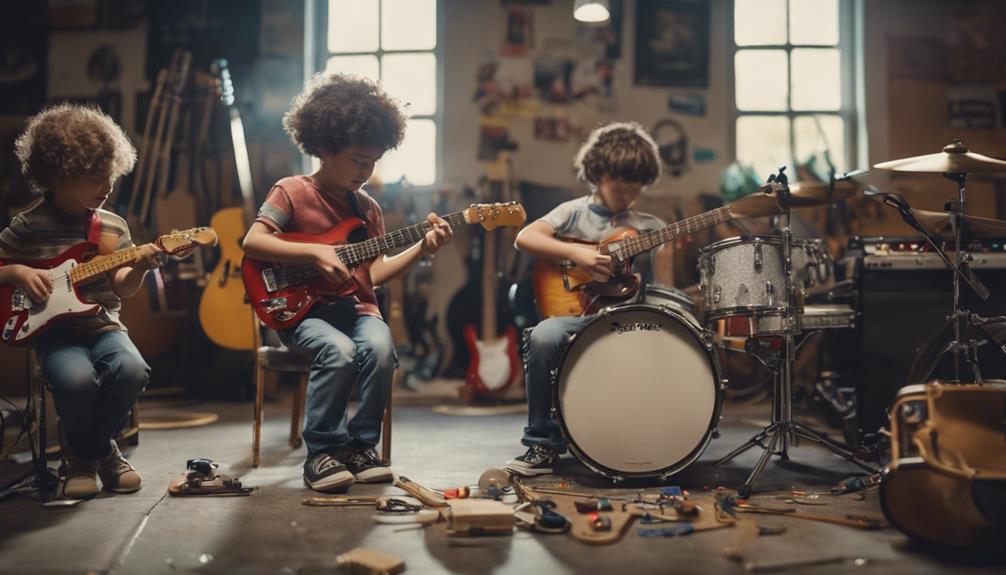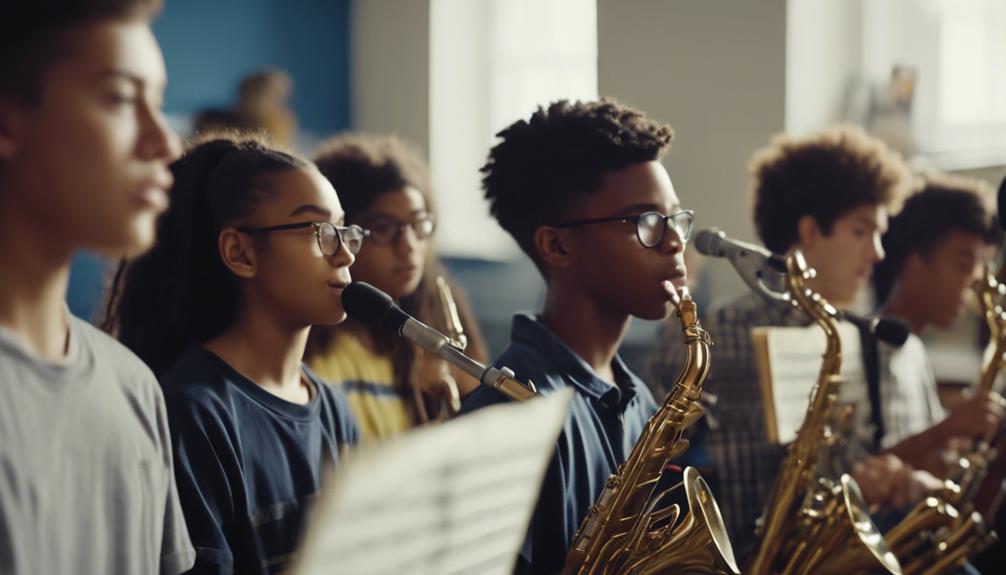Alright, buckle up, because we've got the ultimate guide to kickstart your kid band! First, explore Instrument Exploration to find the perfect fit. Then, create a Structured Practice Schedule for steady progress. Next, groove through Music Genre Exploration to discover their jam. Don't forget to snag a high-quality Music Teacher to guide the way. Cue Family and Friends Performances to shine like rockstars. Emphasize Teamwork for that killer harmony. Encourage Creativity for some mind-blowing tunes. Celebrate Milestones like true champions. And finally, keep things fun and fresh! Ready for more band-tastic tips?
Key Takeaways
- Select suitable instruments based on child's interests and abilities.
- Establish a structured practice schedule with clear goals.
- Explore various music genres to spark creativity and passion.
- Find a qualified music teacher to nurture talent effectively.
- Engage in family, friends, and community performances for confidence building.
Instrument Exploration and Selection
When exploring instruments for your child's band, consider factors such as size, weight, and complexity to find the perfect fit. The instrument selection process is like finding the ideal puzzle piece to complete the musical picture your child envisions. We want to make sure the instrument not only matches their interests but also suits their physical abilities and age. It's important to consult with music teachers or experts who can offer valuable insights into choosing the best instrument for your budding musician.
Allow your child the opportunity to try out different instruments before committing to one. This hands-on approach can help them discover which instrument feels most natural and sparks their passion. Remember, the goal is to make this experience enjoyable and exciting for your child, so let them explore and experiment with different options. By taking the time to carefully consider all these factors, you can make sure that your child's musical journey starts off on the right note.
Structured Practice Schedule
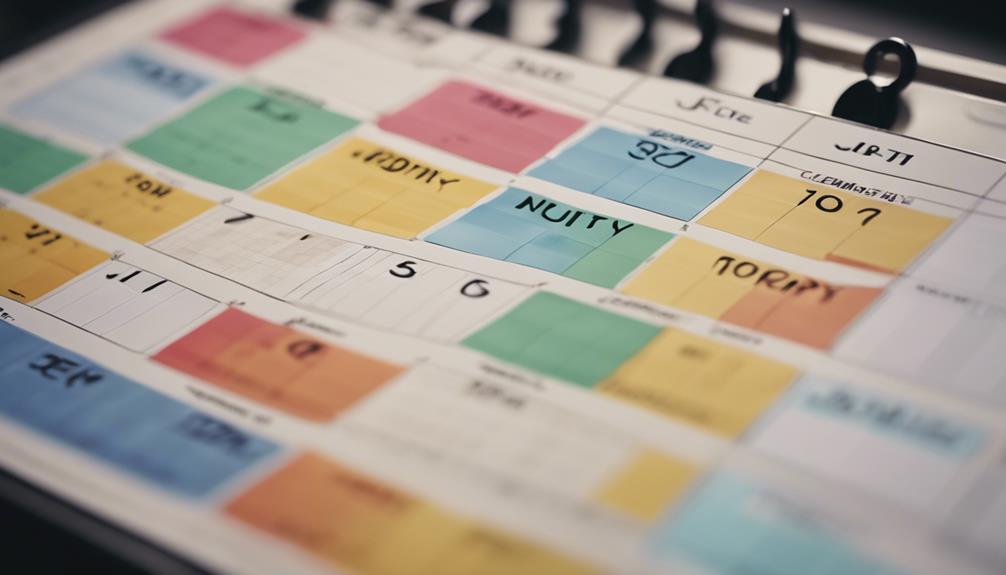
Alright, folks, let's talk about getting that practice schedule locked in!
We gotta set clear goals, manage our time wisely, and keep those rehearsals consistent.
Trust me, a structured practice plan will take us from 'okay' to 'rockstar' in no time!
Set Clear Goals
Establishing a structured practice schedule is essential for the success and growth of a kid band. Practice makes perfect, so setting clear goals is vital in guiding your band towards improvement. By defining short and long-term objectives, you provide a roadmap for progress. Here's a nifty table to help you visualize how to structure your practice sessions effectively:
| Practice Times | Duration |
|---|---|
| Individual Rehearsal | 30 minutes |
| Group Rehearsal | 1 hour |
| Learning New Songs | 45 minutes |
| Refining Songs | 30 minutes |
| Technique Practice | 15 minutes |
Time Management Tips
How can we effectively manage our time through a structured practice schedule to optimize our band rehearsals and progress? Here are some innovative time management tips for band practice:
- Chunking Time: Divide your practice session into chunks focusing on specific skills or songs. This technique helps in maintaining focus and making the most out of your practice time.
- Pomodoro Technique: Try using the Pomodoro technique, working for 25 minutes with intense focus, then taking a short break. This can boost productivity and prevent burnout during band practice.
- Digital Tools: Explore apps or practice logs to track your practice time and set goals. These tools can help you stay organized and motivated throughout your band practice sessions.
Consistent Rehearsals
To maximize our band's progress and unity, we implement a structured practice schedule that guarantees consistent rehearsals. Practicing regularly is like watering a plant – it helps us grow and bloom! Check out our innovative practice schedule below to see how we rock our rehearsals:
| Day | Time |
|---|---|
| Monday | 4-6 pm |
| Wednesday | 4-6 pm |
| Friday | 4-6 pm |
These practice sessions are where the magic happens. We fine-tune our tunes, synchronize our beats, and harmonize our vocals to perfection. Consistent practice not only sharpens our musical skills but also amps up our excitement for upcoming gigs. So, grab your instruments, tune in, and let's make some musical memories together!
Music Genre Exploration

Exploring a variety of music genres can spark a passion for music in children and expand their musical horizons. Here are three ways we can immerse ourselves in the world of music genres with your young bandmates:
- Rock, Pop, Jazz, Classical, Blues: Let's kick it off by introducing the gang to a mix of these genres. From the electrifying beats of rock to the soulful melodies of blues, there's a whole universe of sounds waiting to be explored. Who knows, maybe your little rockstar is actually a jazz aficionado in the making!
- Broadening Musical Horizons: By delving into different styles, your bandmates can develop a diverse musical taste. They might discover a newfound love for classical symphonies or get groovy with some funky pop tunes. It's all about expanding those musical horizons and finding what resonates with each member.
- Discovering Preferences and Inspirations: Exposing the kids to various genres helps them pinpoint what they love most. Whether it's the raw energy of rock or the sophistication of classical music, these experiences can shape their musical preferences and spark creativity in unexpected ways. So, let's delve into the melodic melting pot and see where it takes us!
Finding a Qualified Music Teacher

When seeking a qualified music teacher for our young band, prioritizing relevant qualifications and experience is essential for fostering musical growth and development. It's like finding the perfect harmony for our budding musicians! We want to find someone with a music degree or certifications, like the Ph.D. of Music Awesomeness.
Experience is key too, so look for teachers who've rocked out with kids before and know how to nurture talent. Get the inside scoop from other parents or music schools to find someone who's like the Beyoncé of music teachers – trusted, reliable, and inspiring.
Safety first! Make sure your chosen teacher has all the necessary clearances and background checks. We're talking rock-solid protection for our little rockstars. And hey, teaching style matters too! Look for someone who can communicate well, engage the young minds, and motivate them to reach for the stars.
It's all about finding that magical mix of expertise and enthusiasm to set our kid band on the path to musical greatness. Let's rock and roll, but safely and with the right teacher by our side!
Family and Friends Performances

Imagine this: you've got your budding kid band all prepped and ready to rock. Now, it's time to show off those skills in front of the toughest (and most loving) critics – your family and friends! Private home concerts, local community shows, or even school talent performances – choose your stage and get ready to shine!
Trust me, there's nothing like the support and cheer from your inner circle to boost your confidence and make those performances extra special. Let's get those guitars tuned, drumsticks ready, and voices warmed up – it's showtime for our favorite fans!
Private Home Concerts
Private home concerts provide a cozy setting for young band members to showcase their musical talents to family and friends. Here are three reasons why these intimate performances rock:
- Confidence Boost: Kids can strut their stuff in a familiar setting, gaining confidence and stage presence without the pressure of a big crowd.
- Feedback Galore: Family and friends become the ultimate fan club, offering feedback and cheers to help the band fine-tune their skills.
- Memorable Moments: From jamming together to enjoying the music, these home concerts create unforgettable memories for the bandmates. It's like a musical sleepover, but with more guitars and less sleeping!
Local Community Shows
Attending local community shows allows young band members to connect with their audience in a familiar and supportive environment. These shows are like mini rock concerts but with the added bonus of having your grandma cheering you on in the front row. It's a chance for family and friends to see the budding rockstars in action and provide that much-needed moral support. Plus, the vibe is always electric, and the energy from the crowd can really amp up the performance. Check out the table below for a quick overview of the perks of rocking out at local community shows:
| Benefits of Local Community Shows |
|---|
| Familiar Audience |
| Supportive Environment |
| Valuable Feedback |
| Stepping Stone to Larger Performances |
School Talent Performances
School talent performances provide an exciting opportunity for young musicians to showcase their skills in front of their closest supporters and receive valuable encouragement. These events aren't just about hitting the right notes; they're about creating unforgettable memories with those who cheer you on. Here's why we love school talent performances:
- Supportive Atmosphere: It's like having your personal fan club right there in the audience, rooting for you every step of the way.
- Confidence Boost: Stepping onto that stage boosts your confidence like nothing else. You feel like a rockstar, even if it's just for a few minutes.
- Building Connections: Sharing your music with friends and family strengthens bonds and creates a sense of togetherness that's truly special.
Supportive Learning Environment

Exploring a nurturing environment that encourages creativity and fosters confidence is essential for young musicians in a kid band. When kids feel supported and inspired, they are more likely to delve into their musical talents and push past their boundaries. Let's delve into what a supportive learning environment entails:
| Key Elements | Description |
|---|---|
| Positive Reinforcement | Acknowledging and rewarding progress motivates young musicians to excel. |
| Constructive Feedback | Offering guidance for improvement helps kids grow and develop their skills. |
| Safe Space for Expression | Allowing freedom to experiment without judgment encourages musical growth. |
| Clear Goals & Expectations | Setting targets helps kids focus and gives them a sense of direction. |
| Collaboration Opportunities | Encouraging teamwork enhances creativity and fosters a sense of community. |
Emphasis on Teamwork and Collaboration

When it comes to starting a kid band, we gotta remember one thing—teamwork makes the dream work! Collaboration is like a secret sauce that flavors our music journey, adding a pinch of creativity and a dash of unity.
Together, we harmonize our differences and rock the stage as one awesome band!
Teamwork Is Key
Fostering collaboration within a kid band is essential for developing communication skills and teamwork among bandmates. Here's why teamwork is key:
- Compromise and Coordination: Working together in a band teaches children the importance of compromise and coordination, ensuring everyone's ideas are heard and valued.
- Listening and Contributing: Bandmates learn to listen to each other's ideas and contribute to a harmonious musical experience, creating a dynamic and cohesive sound.
- Unity and Shared Achievement: Shared responsibilities in a band promote a sense of unity and shared achievement, fostering a supportive environment for growth and development.
Teamwork in a kid band isn't just about making music together; it's about building skills that will help kids succeed both on and off the stage.
Collaboration Breeds Success
How does collaboration within a kid band pave the way for success through teamwork and unity?
Well, let's break it down – when you've got a group of young rockstars working together, magic happens! Collaboration isn't just a fancy word; it's the secret sauce that makes your band stand out.
Picture this: you're jamming with your bandmates, and suddenly, someone suggests a killer guitar riff that takes your song to a whole new level. That's the power of collaboration!
By bouncing ideas off each other, sharing responsibilities, and communicating like pros, you're not just making music – you're creating something extraordinary.
Unity in Diversity
Collaboration within a kid band not only amplifies creativity but also cultivates a harmonious blend of diverse talents and perspectives, fostering a unified musical journey. When teamwork is the name of the game, magic truly happens! Here's why:
- Diverse Backgrounds, Unified Vision: Teamwork in a kid band brings together unique backgrounds and music preferences, creating a melting pot of creativity that spices up your tunes like never before.
- Idea Sharing and Compromise: Collaboration encourages sharing ideas, compromising on creative decisions, and working towards a common goal. It's like a musical potluck where everyone brings something exciting to the table.
- Life Skills Masterclass: Teamwork teaches children essential life skills like communication, respect, and conflict resolution. Who knew rocking out together could be so educational?
Encouraging Creativity and Experimentation

Encouraging creativity and experimentation in music allows young band members to freely explore their musical potential and develop their unique talents. It's like giving them a giant playground filled with musical instruments where they can let their imaginations run wild.
When kids get the chance to be creative, they can express themselves in ways they never thought possible. Experimentation is like being a mad scientist but with music – trying out new sounds, styles, and techniques to see what magical concoctions they can come up with.
By providing a safe space for creativity and experimentation, we're nurturing a love for music and a hunger for knowledge. Who knows, maybe the next musical genius is just waiting for the opportunity to mix things up and create something extraordinary.
Celebrating Progress and Milestones
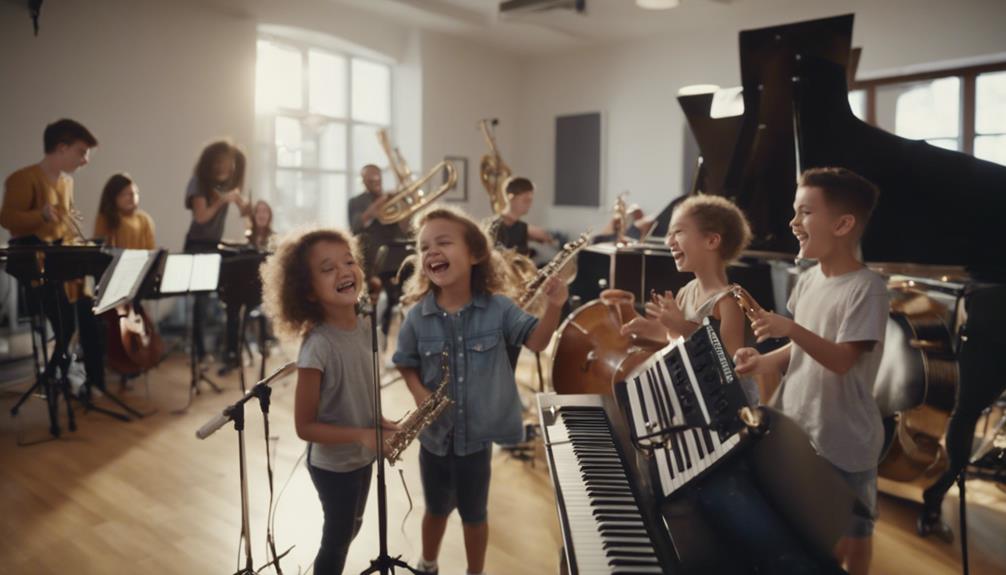
After fostering creativity and experimentation in music, it's important to celebrate the progress and milestones achieved by young band members. So, how do we make these celebrations as rockin' as our tunes? Here are a few ideas to amp up the excitement:
- Acknowledge and Reward: High-five those budding musicians for learning a new song or conquering a challenging section. Positive reinforcement goes a long way in boosting morale and keeping the groove alive.
- Chart the Course: Create a visual progress chart or milestone tracker. Seeing accomplishments laid out can be super motivating and a great way to track how far the band has jammed.
- Stage a Show: Host a mini-concert or showcase for friends and family. It's time to shine like rockstars and bask in the applause. Plus, it's a fantastic way to share your progress and hard work with those who matter most.
Making Learning Fun and Enjoyable
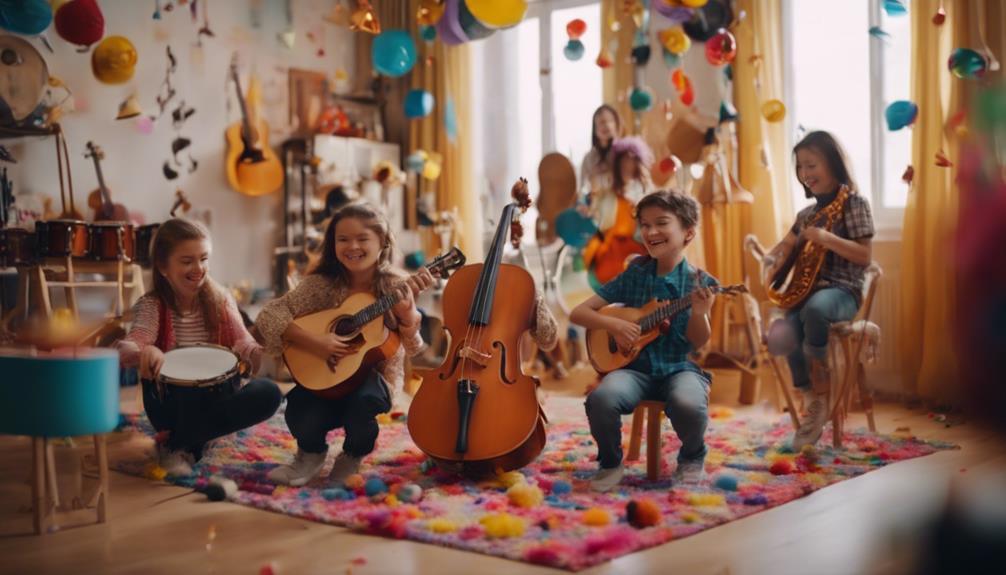
To make learning fun and enjoyable for kids, we incorporate games, singing, and movement into our lessons. Imagine this: a game of musical chairs to learn about musical notes, a karaoke session to practice vocals, and a dance-off to feel the rhythm in our bodies. By infusing these elements into our teaching, we turn what could be dull lessons into engaging experiences that make our young musicians excited to learn.
But we don't stop there! We bring in popular tunes from today's music scene to keep things fresh and relevant. Envision strumming along to the latest pop hit or drumming to a catchy chart-topper. By connecting music lessons to what kids already love, we make sure that learning feels less like a chore and more like a jam session with friends.
In our band, we also encourage peer teaching. Nothing boosts confidence and creates a positive learning environment like having students teach each other. It's a win-win situation: the teacher reinforces their knowledge, and the student learns from a peer in a relatable way. Learning fun? We've got it covered!
Frequently Asked Questions
What Do You Need to Start a Band as a Kid?
To start a band as a kid, you gotta round up some music-loving pals or hold auditions. Quality instruments are a must for excellent tunes. Brainstorm with your bandmates to pick a cool name that screams your style.
Get those creative juices flowing by penning your own songs. Stick to a regular practice routine to groove together and boost your musical talents.
Let's rock this kid band journey!
How Do I Start a Band at 10 Years Old?
Alright, so you wanna start a band at 10 years old? That's awesome! First things first, gather your crew of musically inclined pals.
Pick instruments that spark joy in your heart. Practice together like there's no tomorrow.
Look for gigs at school events or local spots to strut your stuff. It's all about having fun and making killer music together.
Let's rock and roll, kiddos!
How Do You Start a Band for Beginners?
Starting a band for beginners is all about finding pals who groove to the same beat. Share the music bug on social media or in your hood to recruit bandmates.
Jam together, see if the vibes mesh, and start rockin' those auditions. Invest in quality instruments for epic sound. Brainstorm a rad band name that showcases your style.
Get ready to showcase your musical talent and rock the stage!
What Equipment Is Needed to Start a Band?
When you're diving into the music world, you gotta gear up right! Instruments like guitars, drums, keyboards, and microphones are key. Don't forget amps, cables, and drumsticks for those rockin' performances.
And for rehearsals and gigs, quality sound systems and mixers are a must. Recording your tunes? Grab microphones, audio interfaces, and software.
Oh, and keep those picks, drum pads, and cases close by for care and maintenance. Get ready to rock!
What Are Some Tips for Starting a Band for Teens and Kids?
For starting a band as a teenager, it’s important to find like-minded individuals with similar musical interests. Choose a cool band name and decide on the type of music you want to play. Practice regularly and be open to feedback from each other. And most importantly, have fun making music together!
Conclusion
So there you have it, folks! Starting your kid band may seem like a challenging task, but with the right steps and a lot of enthusiasm, it can be a fun and rewarding experience for everyone involved.
Did you know that 75% of successful bands started when they were just kids jamming in their parents' garage? Imagine the memories you'll create and the music you'll make together.
So go ahead, grab some instruments, gather your friends, and let the music begin!
